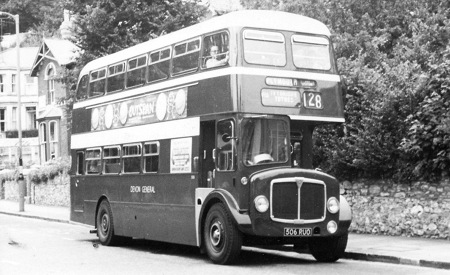
Photographer unknown – if you took this photo please go to the copyright page.
Devon General Omnibus & Touring Co Ltd
1964
AEC Regent V 2D3RA
Willowbrook H39/30F
This very good looking Willowbrook bodied AEC Regent V of Devon General is I think about to start on its long distance run to Plymouth. It had not been in service very long when this shot was taken in the summer of 1964. It is on route 128 which was Torquay to Plymouth, the via blind reads Ivybridge and Totnes but on looking at a map it should be via Totnes and Ivybridge, still it will be right for the return trip. This route was one of the joint service long distance routes operated with Southern & Western National. Devon General also had an agreement with the largest city in their area Exeter, so Devon General buses did quite a few inner city routes and City of Exeter buses would be seen on some of the out of city routes.
Bus tickets issued by this operator can be viewed here.
A full list of Regent V codes can be seen here.
It is possible that the intermediate display is printed so as to show the places only once, thereby being “wrong way round” on every other journey. This was a fairly common practice where operators quite reasonably sought to avoid wastage of the expensive material.
Chris Youhill
It is a very smart body, perhaps slightly marred by the heavy look of the sliding windows.
Amazing how rear wheel ‘spats’ always improve the look of buses. Was this a common feature of Devon General?
Chris Hebbron
24/03/11 – 17:25
Most Devon General AECs had rear wheel trims (dustbins) fitted which improved appearance and made it much easier to keep the wheels clean.
Royston Morgan
15/05/13 – 15:29
Does anyone have any information on a very old green bus (could date from as early as the 1920s) which was sited in Wakeham’s Field in Shaldon, Devon in 1951. I came with my parents and sisters to Devon that year and we lived for nine weeks on the camp site whilst waiting for a house. We lived in an old bus for the final few weeks. It had been partly adapted as living accommodation. It had a former Admiral’s (or Captain’s) bathroom area installed – a quite grand mahogany wash basin which lowered down. I have recently seen one of these contraptions on the Antiques Roadshow. I think we still had to pour water from a container into the basin but it drained away after use into the area which would once have been the driver’s place. The bus itself had long seats on the right side as you went in – rows of them I mean, rather than the normal two x 2 each side. Each seat would have taken 4- 5 people. I think some of the windows may have been painted over – probably because there was no way of having curtains. I have never seen a bus of that design anywhere other than the Midlands in the late 40s.
Mary Grant
Leave a Reply